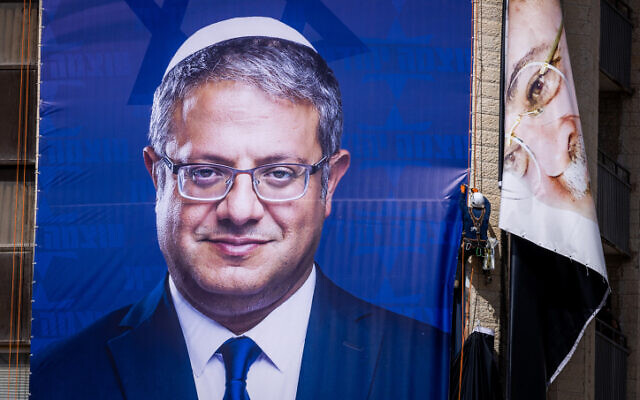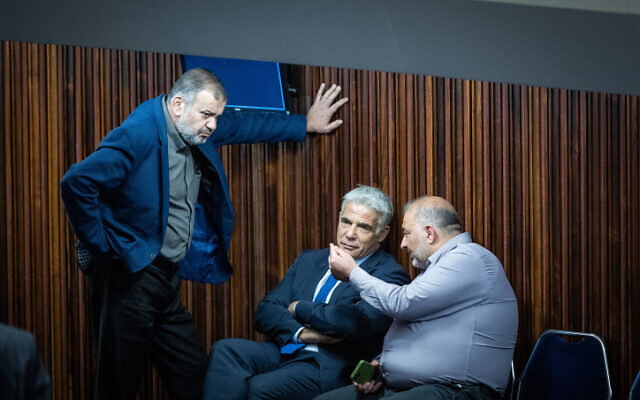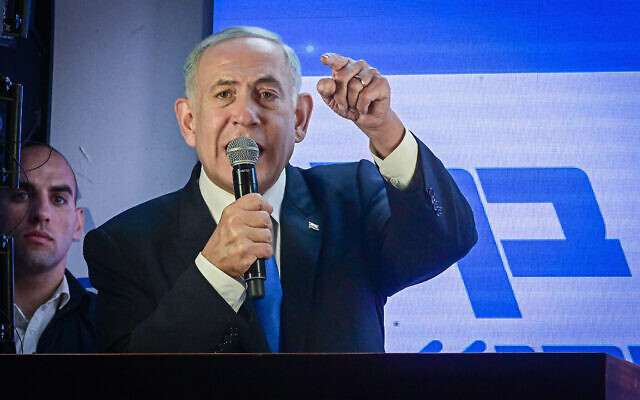Netanyahu vows to ‘neutralise’ Lebanon deal
A day before election, Likud leader asserts he’ll maintain Temple Mount status quo, denies 2021 coalition talks with Arab party and pledges to quash bills that would affect his trial.
Less than a day before polls open, Likud leader Benjamin Netanyahu said that far-right lawmaker Itamar Ben Gvir is a viable candidate for police minister if Netanyahu’s bid to reclaim the premiership is successful.
“I don’t disqualify him” for the post of public security minister, but “there are a lot of candidates,” Netanyahu told Army Radio on Monday, in his first interview with the state-sponsored outlet since losing the premiership last year.
“Likud has to be the biggest party, and only then I can appoint ministers like Ben Gvir and [Bezalel] Smotrich,” Ben Gvir’s running mate in the Religious Zionism-Otzma Yehudit alliance.
Ben Gvir on Sunday announced he would be demanding the post of public security minister, responsible for the police, if Netanyahu forms the next governing coalition. Ben Gvir told Army Radio on Monday that he raised the issue with Netanyahu when they met last Thursday and that the Likud leader was supportive. “I’m not quoting word-for-word, but there was considerable enthusiasm” for the idea, said Ben Gvir. “He and his people said it would bring in votes from outside the [Netanyahu-led] bloc and bring us the 61st seat.”
The current public security minister, Omer Barlev, fumed at Ben Gvir’s demand, calling him “a draft-dodging cowardly thug, who waves his gun around while hiding behind a truck protected by security personnel.”
Hebrew media outlets also reported that Ben Gvir’s announcement Sunday was coordinated with Netanyahu, who supported it as an effort to draw out voters before Tuesday’s election, without promising to appoint Ben Gvir to the post. At the same time, unnamed senior Likud sources told Army Radio that they believed it would alienate voters, that they were frustrated with Ben Gvir, and that they felt their party had “lost control” over the “power-drunk” politician.
Last week, Netanyahu reaffirmed that Ben Gvir “certainly can” be a minister in a Likud-led government. As recently as last year, Netanyahu had said Ben Gvir was unfit to be a minister.

Netanyahu has twice brokered an alliance between Ben Gvir and Smotrich in order to shore up his rightward flank in the battle to form a stable government — a struggle against rival parties that sees Israel now entering its fifth round of elections since 2019. Likud candidates and Netanyahu have claimed that, as their party would be directing policy at the head of a right-religious coalition with Religious Zionism and the two Haredi parties, the impact of some of Religious Zionism’s more extreme policies would be mitigated.
In his Monday interview, Netanyahu reaffirmed that he would “maintain the status quo” on Jerusalem’s flashpoint Temple Mount, despite ongoing political pressure from Ben Gvir for Israel to flex its sovereignty there. According to the longstanding arrangement, anyone can visit the holy site but only Muslims can pray there.
If appointed public security minister, Ben Gvir would be responsible for keeping the peace at the Temple Mount, known as Haram Al-Sharif or the Al-Aqsa complex to Muslims.
Turning to Israel’s freshly inked maritime border agreement with Lebanon, Netanyahu pledged to “neutralise” the pact if his bid to reclaim the premiership is successful.
“I will behave as I did with the Oslo Accords,” he said, claiming those agreements with the Palestinians “were not canceled, they were neutralised.”
Staging fierce opposition to the agreement before it was signed by Prime Minister Yair Lapid and Lebanese President Michel Aoun on Thursday, Netanyahu had said the deal was “illegal” and he would not be bound by it. The opposition leader did not detail his specific intentions for the agreement on Monday.
Speaking to Army Radio, Netanyahu again rebuffed claims that after the March 2021 election he negotiated with the Islamist Ra’am party for its support in building a coalition.
“It’s a lie. We told them dozens of times that you won’t be in the government, you won’t be in the coalition, because you are against Zionism and you support terror,” said Netanyahu.
While Netanyahu did not deny that he had met with Ra’am leader Mansour Abbas at the Prime Minister’s Residence in Jerusalem, he said the meeting was about a bill to reinstate direct election for prime minister.
He further asserted that he “could have taken” Ra’am as a coalition partner and “didn’t.” Without Ra’am’s four seats, Netanyahu was unable to form a coalition in 2021 and went into the opposition for the first time in 12 years.

Last week, a politically explosive recording surfaced of Smotrich, the Religious Zionism leader, saying Netanyahu was a “liar,” that he had tried to negotiate a coalition with Ra’am, and that Smotrich had blocked that possibility.
Also fueling recent controversy surrounding Netanyahu and his far-right partners have been proposals that could curtail the Likud leader’s ongoing corruption trial.
While Likud has pushed for judicial reform in the next government, it has been outpaced by Smotrich, whose sweeping proposals include canceling the crime of “fraud and breach of trust,” the charge that forms the basis of three of the four corruption charges for which Netanyahu is currently on trial. Ben Gvir, meanwhile, was recorded saying that he would promote retroactively applying a bill to prevent criminal investigations of sitting prime ministers.
Netanyahu told Army Radio that he would not let bills connected to his trial pass in the next Knesset.
“In connection to my trial, I don’t want any law” passed, he said, joking that he has told his allies in Religious Zionism “more than once” that they should “help me less.”
The Likud leader, who maintains his innocence, said he wanted the judicial proceedings against him to be broadcast live, “so every citizen can see how this trial has gotten out of control.”


comments